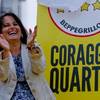Looking Ahead to 2016
ROME -- In his traditional year-end address to Parliament Dec. 29, Premier Matteo Renzi said proudly that, "The facts show that 2015 went better than 2014. It was a good year, with things looking up. Italy has come out of the recession." Indeed, optimism is in the air: for 2015 the Gross National Product (GNP or PIL in Italy) rose by 0.8% over the previous year, slightly higher than predicted. A scouring of the Italian horizon for the coming year shows other fixed points.
Foreign relations: Relations with Europe, or rather with Germany, have slightly soured over Italy's plans for protectionist intervention in private industry and banking, as expressed in the new budget known as the Stability Bill. However, despite some tensions with its European partners, predicts Renzi, "Over the next couple of years Italy will once again play a leadership role in Europe. We shall sit down at the table with the decision makers." Most importantly, with U.S. backing Italy is moving into the forefront in negotiations with the tentative new leadership in Libya, Italy's former colony and its neighbor across a slender stretch of Mediterranean sea. In other areas:
Migrants: Expect more in 2016. ISTAT, the official statistics-gathering agency, shows that the foreign population resident in Italy rose from 4.9 million in 2014 to 5 million in 2015. In what would seem a warning signal, thanks to the calm weather conditions, 4,000 crossed the Canale di Sicilia to land on Italian coastlines in just 36 hours during Christmas week, see >>>
On the other hand, as Renzi told Parliament, during 2015 the number of new migrants -- as opposed to resident population -- arriving in Italy, especially from sub-Sahara Africa, but also from Syria and Lebanon, actually diminished over 2014. To cut back on the illicit traffic, many here urge creation of centers for handling refugees in their countries of origin.
Politics: National general elections are not slated until 2018, but old and new pols will be watching the new year's primaries and then the important mid-year elections for mayors of Rome, Milan, Naples, Trieste and nearly 1,000 other townships. At stake is a test of the relative strength (or weakness) of Renzi's Partito Democratico vis a' vis that of Italy's two largest populist parties, both of whom to some degree emulate Marine Le Pen, Beppe Grillo's Movimento Cinque Stelle (M5S) and Matteo Salvini's Northern League, which he has headed since 2013 and expanded into all of Italy. Some recent polls show only 4% difference between PD and M5S. But even as the anti-party parties grow, by 2016, Silvio Berlusconi's hold on national politics will be virtually nonexistent; during the past year he has lost consensus, even among his former faithful like Sandro Bondi, who called Berlusconi's governing period a "disaster."
Transport: As smog has shut down traffic as well as commerce, city adminitrators beg for commuters to take buses and ride bikes, and plead for reduced prices for public transport. Already there are fewer cars on the road than previously, down 150,000 in 2013 over 2012, the latest statistics available. Nevertheless, as quarrels continue over how much automobile traffic is to blame for the excessive smog ratings, the transformation promoted by such experts as Prof. Umberto Veronesi into solar power, methane gas for heating and electric autos will be slow. Veronese urges the politicians not to use the limitations on driving in town as an alibi to avoid taking more ambitious action. However, Transport Minister Domenico Del Rio promises improvements for 2016 whereby energy requalifications in building with be rewarded with a 65% tax detraction while the new budget has provisions for construction of bike trails and incentives to boost industrial transport via train.
Food: Italian chefs continue to star on the world horizon, even as at home diets are becoming less healthy than in the past. According to Prof. Antonino De Lorenza of the University Tor Vegata in Rome, who heads the national institute on the Mediterranean diet, today's Italian commitment to the Mediterranean diet has dropped almost to the level of that in the U.S. New studies show that the diet of one out of three Italians is ever more poor in fruits and vegetables. The lowest adherence is in the 15-24 age group (32.8%), highest among the over 45's (53%). For the future, experts predict more obesity.
Jobs: Unemployment, which had stood at over 12%, fell to 11%, with 300,000 newly employed. However, only Spain has a higher number of young people who are neither studying nor working, and almost one out of four Italians between the ages of 15 and 29 remains demotivated as well as unemployed. In Europe, the median of these NEETs, as they are called, is of 10% versus Italy's almost 25%.
Sport: Among the worst news items of the year: the coach of a young women's soccer team at Locri in Calabria resigned after receiving anonymous threats, and the whole team is just now shut down. All this may have to do with the fact, still unproven, that the female players were lodged in housing seized from local organized crime bosses of the 'ndrangheta. On this case, "I'll never tire of saying that we have a duty to intervene," says Roberto Saviano, whose best-selling book, Zero Zero Zero, just published in English, was described by the Guardian as "the most important book of the year, the most convincing every written about how the narcotraffic works."




































i-Italy
Facebook
Google+
This work may not be reproduced, in whole or in part, without prior written permission.
Questo lavoro non può essere riprodotto, in tutto o in parte, senza permesso scritto.